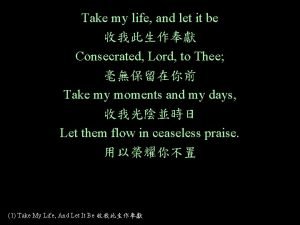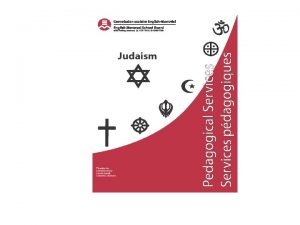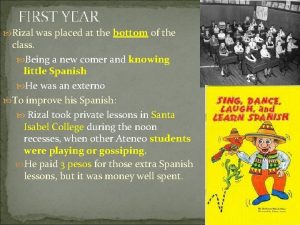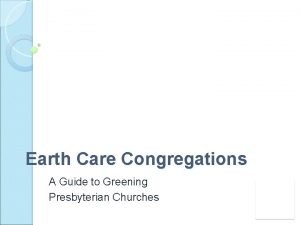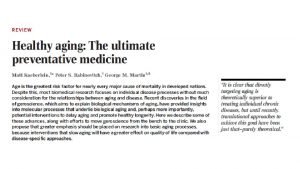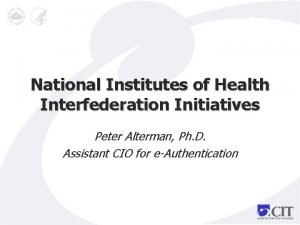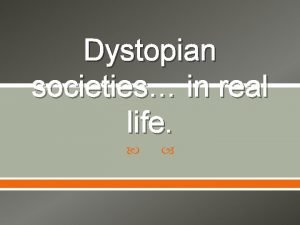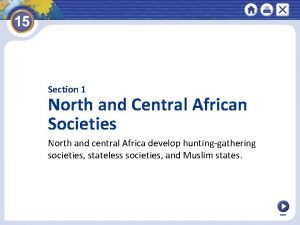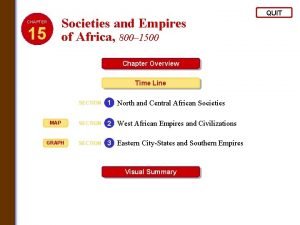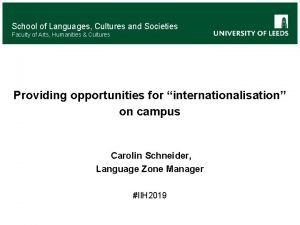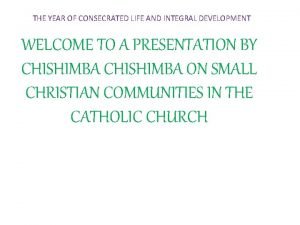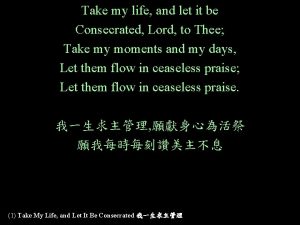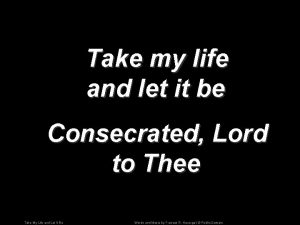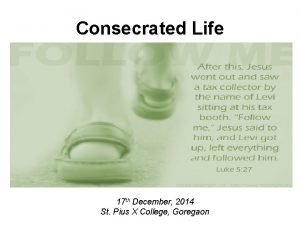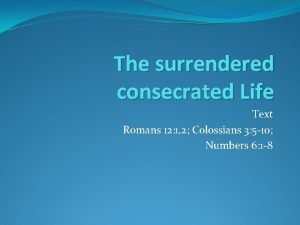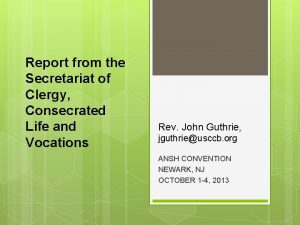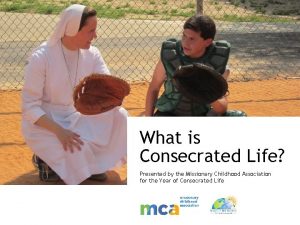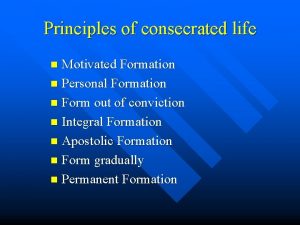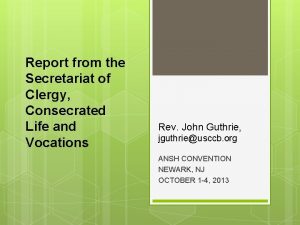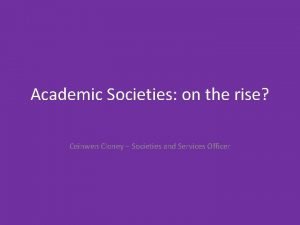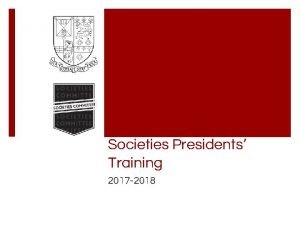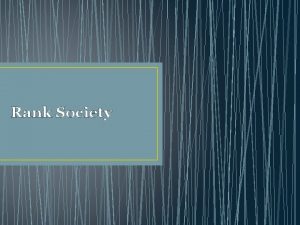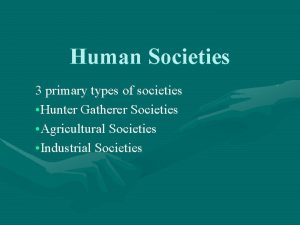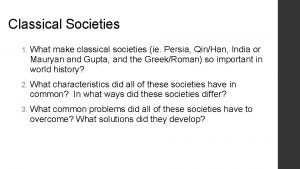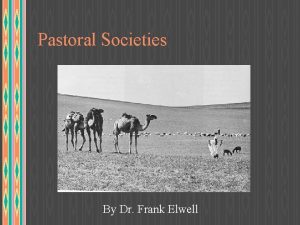CONGREGATION FOR INSTITUTES OF CONSECRATED LIFE AND SOCIETIES



























- Slides: 27

CONGREGATION FOR INSTITUTES OF CONSECRATED LIFE AND SOCIETIES OF APOSTOLIC LIFE THE IDENTITY AND MISSION OF THE RELIGIOUS BROTHER IN THE CHURCH October 4 th, Feast day of Saint Francis of Assisi.

Those associated with the De La Salle Brothers should read it. Why – it reconfirms, validates and explores what the mission, the charism of Religious Brothers, your brothers, the De La Salle Brothers means to the whole Church today. It reminds us in its opening paragraph that: St John Baptist de la Salle

From the first centuries of Christianity, consecrated life has been composed predominantly of lay members, an expression of the yearning of men and women to live the Gospel with the radicalism proposed to all followers of Jesus. (1) The title of brother underlines the common dignity and fundamental equality of all believers. (1) The vocation of the Religious Brother is not always well understood and appreciated within the Church. (1)

John Henry Newman, published in 1859, On Consulting the Faithful in Matters of Doctrine. I think I am right in saying that the tradition of the Apostles, committed to the whole Church in its various constituents and functions per manifests itself variously at various times: sometimes by the mouth of the episcopacy, sometimes by the doctors, sometimes by the people, sometimes by liturgies, rites, ceremonies, and customs, by events, disputes, movements, and all those other phenomena which are comprised under the name of history. It follows that none of those channels of tradition may be treated with disrespect: granting at the same time fully, that the gift of discerning, discriminating, defining, promulgating, and enforcing any portion of that tradition resides solely in the “Ecclesia docens”.

… in a time of immense confusion the divine dogma of our Lord’s divinity was proclaimed, enforced, maintained, and (humanly speaking) preserved, far more by the Ecclesia docta than by the Ecclesia docens, that the body of the episcopate was unfaithful to its commission, while the body of the laity was faithful to its baptism…

I want a laity, not arrogant, not rash in speech, not disputatious, but men who know their religion, who enter into it, who know just where they stand, who know what they hold, and what they do not, who know their creed so well, that they can give an account of it, who know so much of history that they can defend it. I want an intelligent, wellinstructed laity… John Henry Cardinal Newman

In 1873 Newman lamented: As far as I can see there are ecclesiastics all over Europe, whose policy is to keep the laity at arm’s length, and hence the laity have been disgusted and become infidel … I came away from Ireland with the distressing fear that in that Catholic country, in like manner, there was to be an antagonism, as time went on, between the hierarchy and the educated classes.

Newman’s promotion of the laity was met with a barrage of clerical criticism. The most famous retort was supplied by Monsignor George Talbot, a member of the papal court in Rome. In answer to the question What is the province of the laity? Talbot simply replied: “To hunt, to shoot, to entertain. ”

Contemporary clerical wags suggest a less Downtown Abbey answer. The laity’s vocation is to pray up, pay up and shut up! Here are the answers to the question posed to me by the conference organizers: now we can retire to morning tea, with the laity in our midst having a clear vision of their ministry within the Church Community. However, I suspect you might not be entirely happy either with the answers provided about the laity’s role or the brevity of my talk.

In Talbot’s answer - To hunt, to shoot, to entertain - we discover an abiding clerical fear – the laity might get the mistaken idea that they have responsibility for the good health of Christ’s Church OR the more alarming idea that the laity, and not the bishops, are in charge of Church life.

The spirituality and resources of the Brothers nurture you as you share in their Institute’s charism – that is exactly why you are here at this Conference.

Why did Monsignor Talbot and his clerical mates and their lay supporters so wish to exclude the laity from the Church’s life and mission? A brief excursion through the history of religious life helps understand how we found ourselves in such a narrow and unhelpful place. See Kindred Spirits: The Bonding of Religious and Laity, 1987, Maurice Monette

The Reformation, Enlightenment and Rationalism undermined the existence of religious life. The recent letter on Religious Brothers has this say: In the 16 th and 17 th centuries, new founders revitalised the project of lay religious life, this time developing it in communities that, in addition to giving a special place to the fraternal relationship between their members, identified themselves with and were shaped by the social needs that they intended to address. These consecrated fraternities gave rise to the Institutes of Religious Brothers and Sisters. St John of God and St John Baptist de la Salle, as well as St Angela Medici and Mary Ward on the female side. (9).

Religious Brothers, in facing the present, have to risk asking the same question as Paul: “What should I do, Lord? ” Fidelity to the present time requires personal willingness to change and to be disturbed. Without it, there is little value in renewing structures. (26) Brothers offer themselves as guides in the search for God, aware of their own inconsistencies, but able to accompany their contemporaries on their faith journey. (29)

If I really wanted to serve God I would become a religious or a priest or both. Pursuing a secular career was good, but better still to give my life to God in the religious or priestly vocations, the higher way, the superior way. The lay state was a lesser state of perfection.

All the baptized, laity, religious and clergy alike, are called to the same degree of baptismal faithfulness, discipleship and holiness, sharing the hopes and joys, grief and anxieties of the people of the age, especially the poor and the afflicted (G&S 1). This vision of ecclesiology finds no greater supporter than Pope Francis.

The recent document from Rome clearly asserts the lay nature of the Brothers’ vocation within the universal call to holiness of all disciples.

Encouraged by the Spirit, the Church today deepens it awareness of being the People of God, where all have equal dignity received in Baptism, all have a common vocation to holiness, and all share responsibility for the mission of evangelisation. Each one according to their vocation, their charism and their ministry becomes a sign for all the others. (6)

Religious life is born and inserted into this consecrated people, within it lay religious life with a new and special consecration which develops and deepens baptismal consecration. The vocation of the Brother is part of the answer that God gives to the absence of brotherhood which is wounding the world today. 6.

The laity are secular – and that is no longer a slur. The committed lay Christian effectively reminds the Religious Brother that he cannot be indifferent to the salvation of humanity, nor to progress on the earth which is loved by God and geared to Christ. (17)

The Brother reminds the committed lay Christian in the secular society that progress on the earth is not the ultimate goal, and that “the building up of the earthly city has its foundation in the Lord and tends toward Him, least perhaps those who build this city shall have laboured in vain. ” (17)

The task for each of us is to discern God’s universal call to be holy. The recent Roman document is very clear. There is nothing greater than baptismal consecration. Baptism “regenerates us in the life of the Son of God; unites us to Christ and to his Body, the Church; and anoints us in the Holy Spirit, making us spiritual temples”. (14) The Religious Brother, living his lay state through a special consecration, is witness to the value of the common priesthood received in Baptism … His religious consecration is in itself an exercise in the fullness of the priesthood of all the baptised. (16)

Nothing human is alien, and any human situation will always be a potential setting for the Church, an appropriate place for the proclamation of the Good News of the Kingdom. Where are the frontiers today? They no longer coincide with remote location but rather with marginal situations, the peripheries of our world. The vocation of the Brother, authentically lived and embodied in this reality, acquires a wonderful meaning. (30)

Today more than ever, the world needs consecrated person who, from the heart of secular realities and of human life itself, bear witness to knowing and loving the God of life. (31) In short, what does being Brother today imply? The answer to these questions is not easy or simple … A characteristic of Brothers is their concern about being a gift of God the Father for those to whom they have been sent. (32)

The re-birthing and renewal of religious institutes and of the Church in response to the signs of the times is a constant reality and challenge. Yet Pope Francis warns that too much talk, reinventing, planning and collaborating risk being little more than spin, babble and Babel, putting too much trust in committees, programs, research and endless meetings! Pope Francis

The renewal and reform of the Church and of Religious life is an exciting challenge in which all the baptised share. In answer to the questions Why Brothers? , the Roman Document reminds us that: The first ministry that Brothers develop in the Church as religious is “to remind the baptised of the fundamental values of the Gospel” and “the need to respond with holiness of life to the love of God poured into their hearts by the Holy Spirit (cf. Rom 5: 5). All other services and ministries offered by the various forms of consecrated life make sense only when grounded in this first ministry. (7)

Your Brothers like big brothers will help you to grow up: by embracing theology of Vat II and rediscovering Christian discipleship as a renewed living out of the primacy of the sacrament of baptism. by fostering adult relationships of equality. by integrating partnership between men and women moving beyond tokenism.
 Take my life and let it be consecrated lord to thee
Take my life and let it be consecrated lord to thee Beth zion congregation synagogue
Beth zion congregation synagogue Why rizal called champion of filipino students
Why rizal called champion of filipino students Missionaries of st francis de sales
Missionaries of st francis de sales Pcusa earth care congregation
Pcusa earth care congregation Nih institutes list
Nih institutes list Best coaching for iit in agra
Best coaching for iit in agra Go foods
Go foods Wisconsin institutes of discovery
Wisconsin institutes of discovery European network of forensic science institutes
European network of forensic science institutes Top bank coaching in hyderabad
Top bank coaching in hyderabad National institutes for health
National institutes for health Real life dystopia
Real life dystopia History helps us to understand other people
History helps us to understand other people North and central african societies
North and central african societies Refreshments trading account
Refreshments trading account Mali spice t chart
Mali spice t chart Credit union vs building society
Credit union vs building society Ib environmental systems html
Ib environmental systems html Chapter 15 societies and empires of africa
Chapter 15 societies and empires of africa School of languages cultures and societies
School of languages cultures and societies North and central african societies
North and central african societies Fspos
Fspos Typiska novell drag
Typiska novell drag Tack för att ni lyssnade bild
Tack för att ni lyssnade bild Returpilarna
Returpilarna Varför kallas perioden 1918-1939 för mellankrigstiden?
Varför kallas perioden 1918-1939 för mellankrigstiden? En lathund för arbete med kontinuitetshantering
En lathund för arbete med kontinuitetshantering
